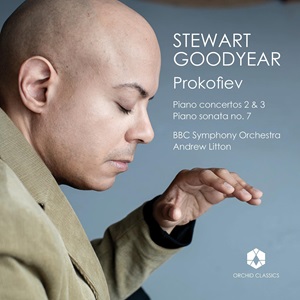
Sergei Prokofiev (1891–1953)
Piano Concerto No 2, Op 16 (1923)
Piano Concerto No 3, Op 26 (1921)
Piano Sonata No 7, Op 83 (1942)
Stewart Goodyear (piano)
BBC Symphony Orchestra/Andrew Litton
rec. 2024, BBC Maida Vale Studios, London and Wyastone Concert Hall, Wyastone Leys, UK.
Orchid Classics ORC100335 [75]
Prokofiev’s second and third piano concertos seem to have fared quite well on disc. There are many excellent recordings and I can’t recall hearing a particularly bad or unsuitable account of them. This recording, with Stewart Goodyear and Andrew Litton, is another excellent addition to the discography.
Goodyear’s approach is light and nimble, it flashes and delights if not quite plumbing the depths. This approach works best in the third concerto, which mixes more playful elements with the thundering virtuosity and romantic lyricism. The second concerto is slightly darker in character and demands a somewhat more imposing personality. Nevertheless his technique surmounts the works’ challenges perfectly well. My main reservation would be in relation to the famous cadenza that takes up most of the second half of the first movement. It is an exercise in tremendous pianistic stamina and requires a pianist in absolute control of their technique able to let loose a torrent of chords, octaves and arpeggios, often in full toned fortissimo. Here, Goodyear sounds a little hesitant, or maybe does not quite posses the temperament or stamina to really shock the listener in this section. Listening to Horacio Gutiérrez in his recording for Chandos with Neeme Järvi shows what is missing. There you have a pianist who really lets loose and with stunning effect. Elsewhere this performance of the second concerto works more effectively. It is quick on its feet, not letting the momentum sag, and sensitive when it needs to be which is something Gutiérrez and Järvi aren’t so good at.
Neither does the Chandos recording capitalise on enough of the lyricism in the third concerto. For a superlative recording of that concerto, then you will want to turn to the famous Argerich/Abbado collaboration from 1967 on DG. Graffman and Szell are also worth checking out and for those who enjoy historical releases then maybe the greatest of all is Kapell and Dorati on Naxos. Still, this recording is better sounding than any of them. It doesn’t provide quite the colour and personality of Argerich, or the concentrated intensity of Kapell, but it does have its own charms. Goodyear and Litton are rhythmically alert, quick without sounding rushed and affecting in the central section of the third movement. Goodyear’s clarity and cleanness of attack in the faster sections of the concerto is entirely admirable and extremely satisfying. The orchestral playing is excellent too, clear and animated, the woodwind section especially impressive, and the sonics first-rate if maybe just missing that last ounce of power in the bass.
I’d be thrilled to hear these performances live and, while on disc, I’d probably opt for Gutiérrez in the second concerto and Argerich in the third. This is a very worthwhile recording to have with much to enjoy, not least the sonics and impeccable playing. The seventh sonata is a welcome bonus addition, but everyone has to compete with Richter when it comes to that work and you’re bound to fall short.
Morgan Burroughs
Previous review: Néstor Castiglione (August 2024)
Buying this recording via a link below generates revenue for MWI and helps us keep free access to the site




















